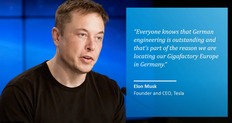- The project will create an estimated 10,000 jobs and is expected to be operational by late 2021.
- The German government is investing hundreds of millions of euros in improving EV charging infrastructure.
- Around 40% of all premium autos worldwide are built in Germany.
- In 2018, 25.7 billion euros, or 37% of Germany's R&D funding, came from the automotive industry.

Project Overview
Berlin (GTAI) - Tesla plans to establish its fourth Gigafactory in Grünheide, Brandenburg, along with a design and engineering center in Berlin. The project is expected to create around 10,000 jobs and aims to be operational by late 2021.
Government Support
German Economic Affairs and Energy Minister Peter Altmaier highlighted the significance of Tesla's decision, noting it as a milestone for Germany's e-mobility and battery-cell production strategy. The German government supports this sector by subsidizing electric vehicle purchases and investing heavily in EV charging infrastructure.
Strategic Importance
Germany Trade & Invest (GTAI) played a crucial role in attracting Tesla to Germany. According to GTAI CEO Robert Hermann, Tesla's decision underscores Germany's attractiveness as an investment and technology hub, facilitating rapid expansion into other EU markets.
Automotive Excellence
Stefan Di Bitonto, a GTAI automotive expert, emphasized Germany's leading position in automotive research and production. Approximately 40% of all premium cars globally are manufactured in Germany, and the country holds a third of all automotive patents worldwide. In 2018, the automotive industry contributed 25.7 billion euros to Germany's R&D funding, accounting for 37% of the total.

